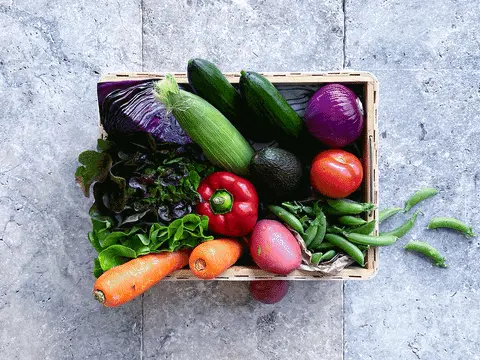health
Nutrition and diet
Preventive nutrition
The vegetables and fruits that reduce the risk of heart disease
Cardiovascular disease is one of the leading causes of death in the world, but it can be partially prevented by improving nutrition.
Eating vegetables and fruits for example works on several levels that help heart health.
Here are the best
Tags
fruits
vegetables
heart diseases
diet
Merav Mor-Ofir
Wednesday, 27 October 2021, 07:52
Share on Facebook
Share on WhatsApp
Share on general
Share on general
Share on Twitter
Share on Email
0 comments
Stroke
Facts about the brain
Facts about coffee
Who and what pre-diabetes
Elrai Price: I do not think we will need a vaccine in every half ...
Corona vaccine study in 18-12 year olds: 90% efficacy ...
Methods to get rid of nausea and insomnia
Her daughter filmed her taking a live shower
Five facts about tomatoes
Exercises for relieving back pain in seconds
Bennett: We can safely say that we are winning the wave ...
The dancing doctor recommends - sex strengthens the system ...
Iris Cole interviews Dr. Ofer Habakkuk about risk factors for cardiac arrest (Walla system!)
Cardiovascular disease, such as heart attack or stroke, are among the leading causes of death in the world.
But there is also good news.
Studies consistently point to a link between increased consumption of vegetables and fruits and a reduction in the risk of these diseases.
Studies show a 4 to 11 percent reduction in the risk of coronary heart disease, with each increase of about 100 grams per day in the consumption of vegetables and fruits.
Just for the sake of example - a medium apple weighs about 80 grams.
Cardiovascular disease is characterized by increased oxidative processes, dysfunction of the endothelium (the cell tissue lining the surface of blood vessels) and structural changes in blood vessels.
These oxidative processes involve the production of oxidized LDL-cholesterol ("bad cholesterol"), which plays a key role in the development of atherosclerosis.
It penetrates the walls of the arteries, accumulates in them and encourages the development of an inflammatory response.
The development of atherosclerotic plaque along with the inflammatory condition can eventually cause instability of the plaque until it breaks, which can lead to blood clot formation, blockage and infarction.
More on Walla!
New guidelines: Taking aspirin to prevent heart attacks and strokes can be dangerous
To the full article
An analysis of nearly a hundred studies published in 2017 found a reduced risk of cardiovascular disease as well as mortality from any cause, with the increase in consumption of vegetables and fruits, up to the consumption of 800 grams of vegetables and fruits per day.
With each 200-gram increase in fruit and vegetable intake, there was an 8 percent decrease in the risk of coronary heart disease, a 16 percent decrease in the risk of stroke, and a 10 percent decrease in the risk of mortality from other causes.
Even one more vegetable a day or fruit can contribute to your heart.
Fruit and vegetable gif (Photo: Giphy)
The American Heart Association recommends consuming 8 servings of vegetables and fruits a day or more, from a variety of colors.
Scientific studies have found that apples, pears, citrus fruits, leafy greens, vegetable salads and cruciferous vegetables are associated with maintaining heart health.
More on Walla!
This is what two apples a day can do to your heart
6 reasons to choose a plant-based diet
9 foods that will lower your blood cholesterol
B-Cure Laser - How Does It Work And Reduce Pain?
Thus fruits and vegetables contribute to heart health
Reducing the risk of high blood pressure
Clinical studies suggest that consuming vegetables and fruits affects the regulation of blood pressure levels.
For example, the well-known study "Dietary Approaches to Hypertension" (DASH) conducted under highly controlled conditions, showed that consuming vegetables and fruits contributes to a significant decrease in blood pressure levels over a period of 8 weeks.
In another community study, people who were instructed to consume five servings of vegetables and fruits per day for 6 months had lower blood pressure values than the control group who did not receive this dietary instruction.
A review of a number of recently published studies found that the DASH diet pattern is associated with a reduction in morbidity and mortality from heart disease, stroke and diabetes, as well as a reduction of about 5 mm Hg in systolic blood pressure and 3.5 mm in diastolic blood pressure.
Vegetables and fruits are low in sodium - which can lead to the development of high blood pressure - and on the other hand are rich in potassium and magnesium, which have the opposite effect on blood pressure. Vegetables are also a source of nitrates - new studies point to their great importance in lowering blood pressure levels and protecting vascular health. In addition, consuming vegetables and fruits helps prevent obesity, which is an independent risk factor for developing hypertension. The antioxidants in vegetables and fruits, such as vitamin C and other phytochemicals, also have beneficial effects on vascular health.
Reducing oxidative stress and inflammatory processes
Studies show that a diet rich in vegetables and fruits leads to a high concentration of antioxidants in tissues (especially vitamin C, carotenoids and polyphenols), and a lower risk of cardiovascular disease. In clinical trials, vitamin C decreased the protein concentration of the CRP inflammatory marker.
An analysis of the results of about 70 follow-up studies found a link between vitamin C and carotenoid levels in diet and blood, and a reduced risk of cardiovascular disease and mortality from all causes. For example, any increase in 100 mg per day of vitamin C in the diet was found to be 12 percent lower for coronary heart disease, 8 percent for stroke, 11 percent for cardiovascular disease, and 11 percent for all mortality. Causes
Higher concentrations of vitamin C in the blood were found to be 26 percent lower in risk of coronary heart disease, 30 percent in stroke, 24 percent in cardiovascular disease and 28 percent in all-cause mortality.
Colored peppers, citrus fruits, dark leafy vegetables, strawberries, cabbage and orange melon are vegetables and fruits rich in vitamin C. The powerful antioxidant functions of vitamin C, intracellular and extracellular, lead to reduced concentrations of active oxygen molecules in tissues. In atherosclerotic conditions, it helps prevent endothelial dysfunction, inhibits the culture of muscle cells in the artery wall, and reduces the production of oxidized LDL-cholesterol. Dietary intake or blood concentration of total carotenoids, beta-carotene, alpha-carotene, beta-cryptoxanthin, lycopene and vitamin E, which are found in green and orange vegetables, for example, has also been found to have a protective effect against disease.
Cholesterol Reduction
Ingredients from vegetables and fruits also have cholesterol-lowering properties.
For example, dietary fiber, such as pectin from apples, pears and citrus, can bind to bile acids which are a source of cholesterol, thus reducing its levels in the blood.
Various phytochemicals from a variety of vegetables and fruits - such as beta-carotene from orange and green vegetables, tomato lycopene, eggplant saponins and unique artichoke components - also contribute to lowering blood cholesterol levels.
Merav Mor-Ofir is a clinical nutritionist M.SC.
Scientific advisor to the Plants Council
Share on Facebook
Share on WhatsApp
Share on general
Share on general
Share on Twitter
Share on Email
0 comments






